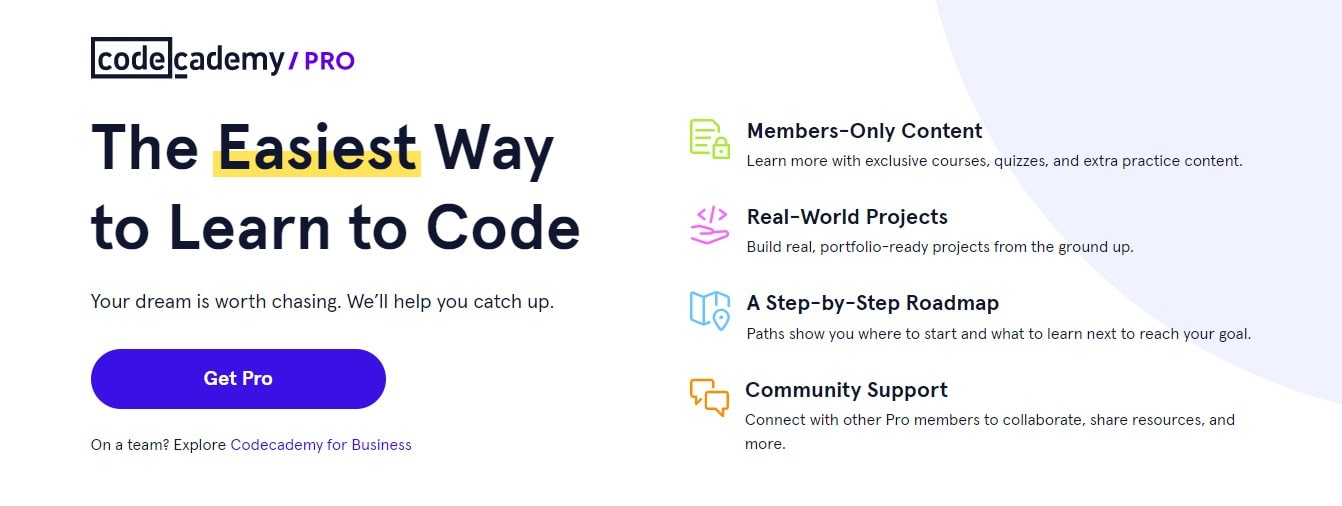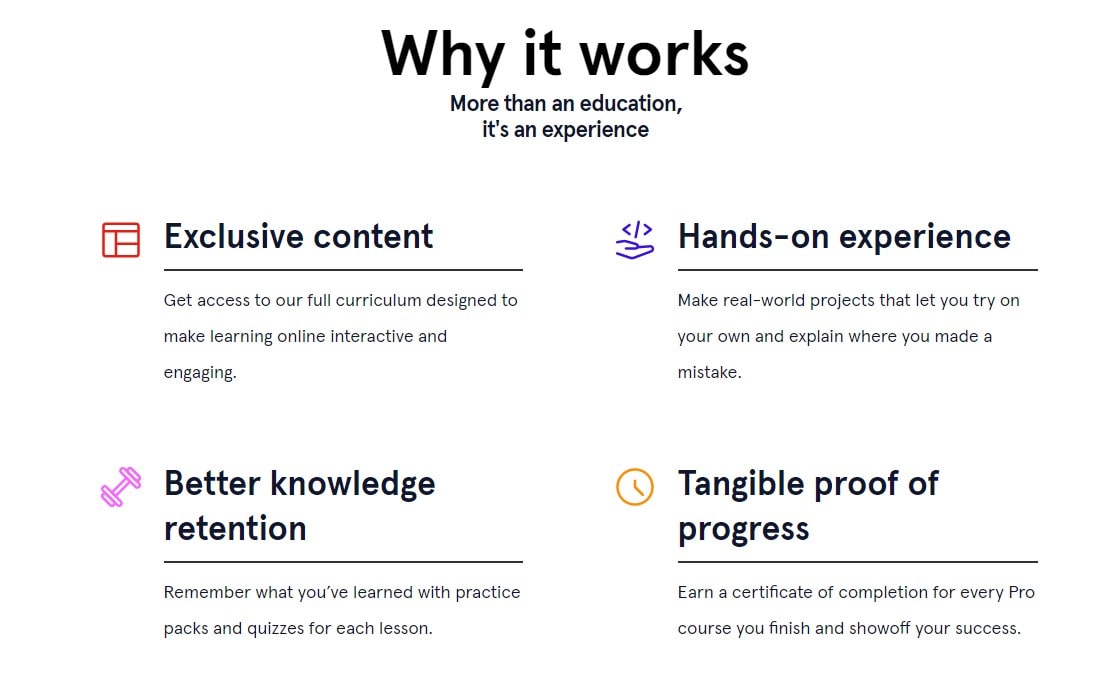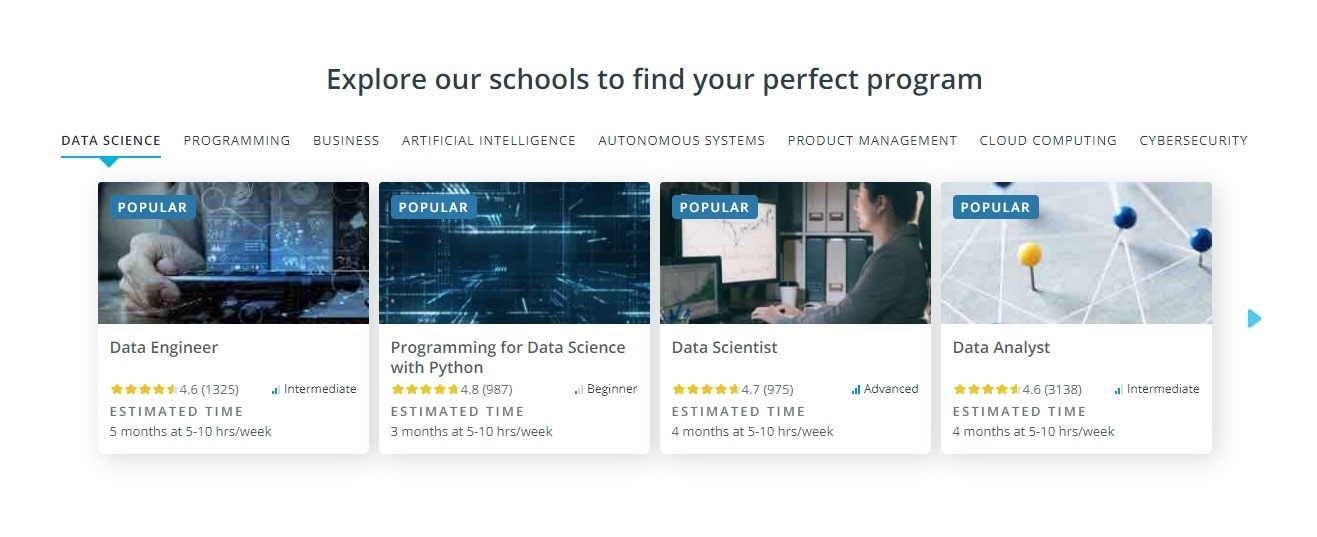Users of teaching platforms have been presenting fewer and fewer objections to this modality. This is because with each new technological resource available, these platforms are increasingly optimized, aiming to guarantee not only a profitable and qualified option, but also a complete user experience, which is truly adapted to their preferences.
This investment, seeking to improve the user experience and increasingly improve the service offered, makes different platforms bet on different demands and market niches. Therefore, each platform ends up specializing in a more specific audience, with qualified options on the market for all types of customers.
In the technology market, Codecademy and Udacity are two notable platforms, but they work more specifically with very different audiences. In this article, we present the main characteristics of these two platforms, so that you can evaluate which one best meets your demand.
What is Codecademy

Codecademy is an online teaching platform that has several courses in the areas of programming and development, covering areas such as:
- jQuery
- Javascript
- Python
- Ruby
- PHP
- JAVA
In addition, the Codecademy platform also has some options for those looking to learn how to work with markup languages, such as HTML and CSS.
How Codecademy works
Codecademy works as a subscription service, where the student can choose between different plans and have unlimited access to all the features offered by that subscription category.
At Codecademy, instead of purchasing the courses individually, you evaluate among the different subscription options which plan is most suitable for you and, after subscribing, you can access the Codecademy resource you want as often as you deem necessary. It is an excellent option for those who do not yet have much professional training and want to specialize in order to enter the market.
After completing the courses that you considered important for your training and not being interested in continuing, you just have to cancel your subscription at no additional cost and your access will be interrupted. However, please note specific regulations for potential courses in progress, as unsubscribing with one or more courses in progress may result in restrictions for you.
>>> CLICK HERE and check out all the Courses
who are the instructors
Codecademy instructors are usually all programming, computer science and IT professionals, many of them linked to large universities (as students or even as professors).
As Codecademy’s priority is to train competent professionals for the job market, the courses are produced by experienced professionals, who have proven experience or academic background in the areas of interest, preferably having worked on challenging projects. Many of Codecademy’s courses are taught by undergraduate, master’s and even doctoral students from major universities in the areas covered by the platform.
Codecademy Prices
Since codecademy works as a subscription service, the price varies depending on the services you want. The platform has the following subscription options:
- Codecademy Basic: free subscription, which gives access to some courses on the platform, support and limited access to options for the mobile version.
- Codecademy Pro (annual plan): subscription equivalent to $15.99 per month. This option gives you access to all the features of the Basic plan, as well as access to a certificate of completion, detailed step-by-step guides and the opportunity to work on real projects from large companies to test your knowledge and feel safe to act in the market.
- Codecademy Pro (Monthly Plan): Exactly the same features as the option above, but you pay $19.99 per month with no commitment to renew your subscription. This option is often chosen by users looking to take just one or two specific courses, without the desire to keep updating their knowledge constantly.
- Codecademy TEAMS: this option requires contacting Codecademy to request an individualized quote, since each company and each team will have their specificities. However, it is worth noting that it is a complete option, with all the features of the Pro plan along with special support for the team and additional options that meet the company’s demand.
Codecademy has Free Courses

Codecademy has many free and excellent quality courses. However, none of the free courses give you access to a certificate of completion, as the free courses are accessed through students who register as a Basic member.
If, after completing the course, you feel that the course contributes to your academic education, simply migrate to a Pro plan and request the certificate of completion.
>>> CLICK HERE and check out all the Courses
user experience
The user experience at Codecademy is quite positive. That’s because, in addition to the different subscription options that make the platform a profitable option, Codecademy students also have access to the support offered by the platform and the option to work on real projects from large companies. This gives students the security of being supported and the confidence to be inserted in the market.
Codecademy has Certificate
Codecademy offers a certificate to all its courses carried out in the Pro and Teams modalities, and the certificate is well accepted in the academic and professional environment. But the certification option is not available for those who opt for the Basic plan (free version of the platform).
Codecademy is worth it

Codecademy is worth it both for you who are new to the technology and programming market, and for you who are already well established and have your professional company. All these profiles are duly served by the different Codecademy subscription plans.
Codecademy Advantages (Pros)
- free courses
- Options for different levels of professionals and very affordable options
- Courses with projects carried out for influential companies in the market
- team support
- Possibility to attend numerous courses and optimize the learning experience
- Solutions for large teams
Disadvantages (Cons) of Codecademy
- Doesn’t have many advanced courses
- Limited options in the Basic version
>>> CLICK HERE and check out all the Courses
What is Udacity

The result of a revolutionary project at Stanford University, where its creators offered the Introduction to Artificial Intelligence online course for free, Udacity has been, since its creation, a true authority in the technology and computer science market. Founded by Sebastian Thrun, David Stavens, and Mike Sokolsky, it is an online course platform focused more specifically on technology and computer science.
Started as a happy experience of enabling interested parties to access the Introduction to Artificial Intelligence course, Udacity has been expressly growing since 2011, the year in which it was founded. Currently, Udacity has facilitated access to education for more than 160,000 students, distributed around the world in more than 190 countries.
How does Udacity work?
Udacity works as an online teaching platform that contributes to the technical and academic training of professionals in the fields of technology and computer science. Aiming to offer valuable courses in line with market demands, Udacity offers free courses (especially MOOC-type courses) and Nanodegree courses, the latter being a true differential of the platform.
From a technical point of view, Udacity’s MOOC courses are very similar to MOOC courses from other renowned platforms that also offer courses in the areas covered by the Udacity platform. That’s because Udacity is among the largest platforms for MOOC courses in technology and computing, and the great leaders of this market niche have in common a commitment to updated and properly grounded content.
However, it is important to mention that the Udacity platform has a great differential: Nanodegree courses. Udacity’s Nanodegree courses are more complete courses, which offer training closer to the experience provided by an undergraduate course at a Higher Education Institution.
To contemplate this differential and offer a truly transformative experience, in addition to having theoretical classes, Udacity’s Nanodegree courses also offer the possibility for the student to carry out real projects, such as a kind of internship in large companies in the areas of technology. This gives the student the opportunity to complete the course having had practical experience and the real aptitude to occupy major positions in the market. These real projects with which the student works during the practical period are projects of Udacity’s partner companies, and this experience gives a high level of security to the student, in addition to assisting him in possible hiring.
Thus, when completing a Nanodegree course at Udacity, you not only receive technical training with valuable theoretical content and updated to market demands, but you also leave with the experience of having already presented practical solutions to these demands in real companies. This is certainly a great advantage of the Nanodegree courses on the Udacity platform.
who are the instructors

The instructors of the courses offered by Udacity are experienced professionals in the market, arbitrarily selected according to their experience and their relevance to the job market. The platform seeks to hire instructors based on technical criteria, that is, based on the instructor’s real experience and aptitude in the area covered by the course.
As Udacity has courses with practical activities (especially the Nanodegree courses), some of the instructors are linked to large universities, both as professors and as researchers at large academic research centers. However, even though academic training is an important differential for the supervision of Nanodegree course projects, most instructors are selected not based on their academic background, but on the basis of their practical experience and their ability to generate value for the Marketplace.
Udacity Prices
Udacity has different pricing for its courses, and pricing is influenced by the level of specialty, duration, and dynamics of the syllabus. For example, courses that are predominantly theoretical have a different price than courses that require practice (especially if the practice is carried out in real company projects, presenting solutions to market demands). The Nanodegree courses, which are broader training courses and have the possibility to carry out practical activities in projects of market leading companies, are charged through monthly fees that cost an average of US$ 400.00 per month. The price of open courses varies between US$ 29.00 and US$ 59.00, normally. These are approximate prices, but keep in mind that prices may vary by category, workload and specialty level.
Udacity has Free Courses

Some of the courses offered by the Udacity platform have the possibility for the student to attend some classes as a visitor. In these cases, Udacity courses are free for these students. But it’s important to note that Udacity’s free courses have some restrictions, including, for example, no certificates being issued. In addition, Udacity’s free courses do not include Nanodegree courses, since even in the initial modules these courses have more complex activities (some of them already requiring the supervision of an instructor constantly).
Udacity’s free courses are a great option for those who want to know the platform, or even for those who already have training in the area of interest and just want to update their knowledge with updated content adapted to current market demands. But considering Udacity’s influence in its market and the perception of value attributed to a professional with a certificate from that institution, it is undeniable that purchasing a course to have the full experience ends up being quite profitable.
>>> CLICK HERE and check out all the Courses
user experience
The user experience that hires Udacity tends to be rated excellent for different reasons. In part, due to the specificity of the public that seeks this platform. As Udacity has very segmented courses for the areas of technology and computer science, everyone who is interested in taking a course at Udacity is already familiar with the areas of interest, or even already works in the area and seeks additional training to stand out in the market.
Another important aspect that contributes to a good user experience and its good rating is Udacity’s commitment to technical quality and the constant updating of its contents. Every course taken at Udacity is based on up-to-date content, and this makes students’ perceptions positive.
Finally, another aspect that tends to contribute positively to the user experience is the professional support that students have, especially the support of Nanodegree courses. When the sum of these characteristics is evaluated, we have a platform that offers quality content, for a very well segmented audience, and also guarantees the possibility for the student to carry out real projects and have access to qualified support to carry out their training.
Udacity is certified
All courses offered by the Udacity platform have a certificate option. However, it is important to point out that the certificates are reserved for acquired courses, that is, for courses paid to have access to them. The courses that you can attend in the listener mode (without any cost to attend classes) do not offer a free certificate. If you complete one of these courses meeting the basic requirements, you must purchase the course to gain access to the certificate.
Udacity is worth it
Both for being an authority in its market and for the technical quality of its courses, Udacity is worth it for anyone looking to work in the areas of technology and computer science.
Advantages (Pros) of Udacity
- Courses carried out with extremely professional technical content and adapted to market demands
- Supported courses and the possibility for the student to carry out projects from real companies, to be able to act in the market
- Nanodegree courses (courses with broader and more complete training, with higher value than technical or professional courses)
Disadvantages (Cons) of Udacity
- Courses with average value just above the market
- Courses with less flexibility regarding the course of classes (some have more specific schedules or deadlines for attending classes and completing assignments, which for certain student profiles is seen as an objection)
>>> CLICK HERE and check out all the Courses
Conclusion
Both the Codecademy platform and the Udacity platform are two great platforms in the technology market, and both offer valuable courses for your professional training. Codecademy is a platform that works as a subscription service, where the student has unrestricted access to all content included in the desired subscription type. For this reason, Codecademy tends to represent the most profitable option, especially for beginner professionals.
Udacity stands out both for its well-targeted approach to a select audience, and for the Nanodegree courses that are a true differential of the platform. Thus, Udacity represents an excellent cost-benefit ratio, and offers you the opportunity to carry out a complete training, in many cases having the opportunity to carry out real projects of large companies in the areas of technology, as well as access to technical and certified support. with excellent valuation by the market.
In this review, you can get to know the main features of these two platforms, in addition to having had the opportunity to know their pros and cons and evaluate which is the best investment for your case. It’s up to you to assess what your priority is at the moment, and visit the platforms’ websites to learn about the course options available.
